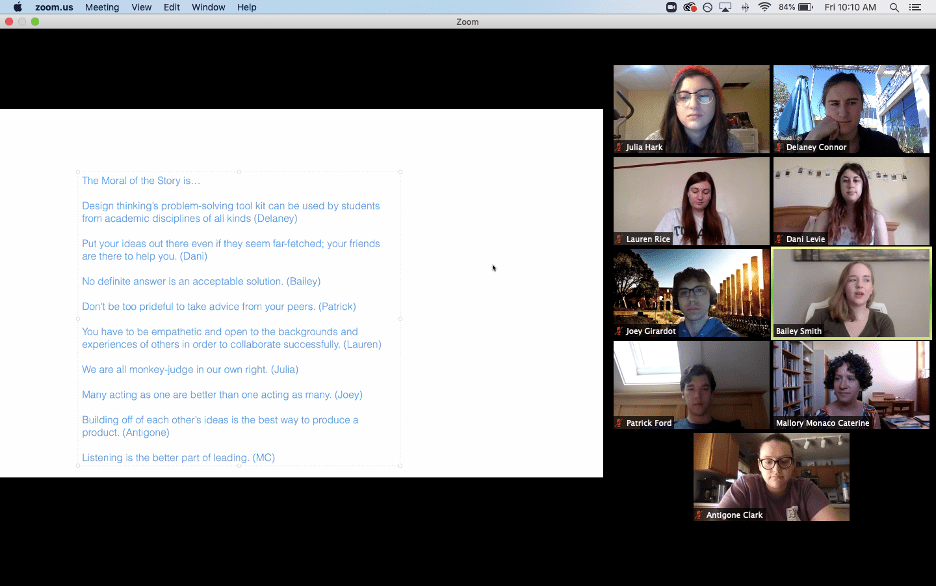
Learning Roman Fables with design thinking
In Spring 2020, Dr. Mallory Monaco Caterine challenged her students to create an inclusive, accessible Classically-based curriculum for New Orleans youth using the tools of design thinking. The seven students in her “Roman Fables” course spent the semester building their design thinking toolkit and learning with community partner, Nyansa Classical Community.
Design thinking in Tulane Teaching
Dr. Monaco Caterine (or Prof MC as her students amicably refer to her) is professor of classical studies at Tulane University and holds the Greenberg Family Professorship in Social Entrepreneurship at the Phyllis M. Taylor Center for Social Innovation and Design Thinking.
To bring design thinking to her work, Dr. Manaco Caterine joined the design thinking faculty learning community sponsored by Tulane’s Center for Engaged Learning and Teaching.
Dr. Lesley-Ann Noel, professor of practice and Associate Director of Design Thinking for Social Impact at the Taylor Center, founded and leads this community of faculty members working to spread design thinking to classrooms and research projects across Tulane’s campus. The diverse disciplines represented in the faculty cohort demonstrates design thinking’s ability to cross boundaries in academia, even ancient into Roman literature and culture.
Partnering with Nyansa Classical Community
Dr. Monaco Caterine and her students spent the semester designing a teaching curriculum for a local service learning partner, Nyansa Classical Community. Led by executive director Dr. Angel Parham, Nyansa runs a weekend academic enrichment program for young people in North Central City New Orleans.
The Nyansa Classical Community brings the resources and joys of Christian classical education to young people who would often not have the chance to take part in this enriching educational experience. Christian classical education is unique in that it provides an approach to learning that is formative as well as informative. Formative education assumes that we are meant not only to engage the mind, but also the spirit of our students.
Both Dr. Monaco Caterine and Nyansa staff have used the Aequora curriculum in past youth programming. Those experiences have shown them the drawbacks of the rigid, and overly advanced curriculum.
Nyansa and Dr. Monaco Caterine partnered on this service project with the aim of creating a more dynamic Latin curriculum. This new curriculum would foster a culture of equity and inclusivity, align with Nyansa’s mission to provide informative and formative education, and share content that is engaging for the teachers and youth participants living in New Orleans.
(re)designing a Classical Curriculum
Every weekend, Dr. Monaco Caterine’s students volunteered at Nyansa as teachers of the Aequora curriculum. As the Tulane students continued to learn from and with Nyansa students and teachers, their ideas for a new curriculum continued to evolve.
Dr. Monaco Caterine scheduled bimonthly design thinking sessions with her students where they could brainstorm and build their design thinking toolkit.
- At these sessions, the students were expected to maintain egalitarian norms and engage in respectful and collaborative discussions.
- They used design thinking tools like the check-in game in the Stoke Deck created by the Stanford d.school.
- The students were instructed to spend a great deal of time understanding the students, teachers, organization, and local community members participating in Nyasa’s programming.
- They started to create their own games. One class was spent playing what Dr. Monaco Caterine referred to as “use, adapt, and discard.” The class divided up Aequora’s dozen or so games and placed them within the three categories. Experience design (UX) often draws inspiration from past systems, and this exercise effectively methodicalized reflection on what worked and what needed to change.
- In one brainstorming session, a student suggested that each lesson be structured like a sitcom. By this, she meant that Nyansa youth participants could attend a single session and still feel engaged by the lesson, similar to the structure of sitcoms. In design thinking, this strategy is referred to as “analogous inspiration.”
Transition to remote learning
When instruction transitioned to remote learning, Dr. Monaco Caterine encouraged her class to be “comfortable with ambiguity and ever-changing mindsets” and reminded them that “having done design thinking seriously for the past few months, [we] can better adapt on the fly.”
During virtual design thinking sessions, Zoom replaced a classroom and a shared Google document replaced a neon green chalkboard as the hub of their in-person collaborations.
Outcome
At the end of the semester, the students had begun designing a curriculum about Roman fables that doesn’t require knowledge of Latin; can adapt to different ages, abilities, and interests; uses diverse images to invite black and brown children to imagine themselves in stories from ancient Rome; and encourages an expansive and critical moral imagination.
This design was based not only on observations and interactions on-site, but through an ongoing dialogue with Dr. Parham and Nyansa staff and students. The curriculum they created together doesn’t just bring Classics to a marginalized group, it empowers students and educators to reimagine and reuse Classics on their own terms.
When the campus closed for the semester due to the COVID-19 pandemic, the student team had just begun prototyping a teachers’ manual and card decks that would accompany a newly designed curriculum.
Student Reflections
In their final class, Dr. Monaco Caterine encouraged students to reflect on the design thinking experience via an original warm up titled “The moral of the story is…”
Here were the students’ verbatim remarks:
Design thinking’s problem-solving toolkit can be useful in classrooms and academic disciplines of all kinds, even remote ones.
-Delaney O’ConnorPut your ideas out there even if they seem far-fetched–your friends are there to help you.
-Dani LevieNo definite answer is an acceptable solution.
-Bailey SmithDon’t be too prideful to take advice from your peers.
-Patrick FordYou have to be empathetic and open to the backgrounds and experiences of others in order to collaborate successfully.
-Lauren RiceMany acting as one is better than one acting as many.
-Joey GiardotBuilding off of each other’s ideas is the best way to produce a product.
-Antigone ClarkListening is the better part of leading.
– Dr. Monaco Caterine
While the team is disappointed that they could not conduct onsite testing of the activities, Dr. Monaco Caterine hopes that “this project will have an organic continuation year to year,” and looks forward to teaching it again in a future semester.
This project is made possible with the support of Tulane’s Center for Engaged Teaching and Learning.
